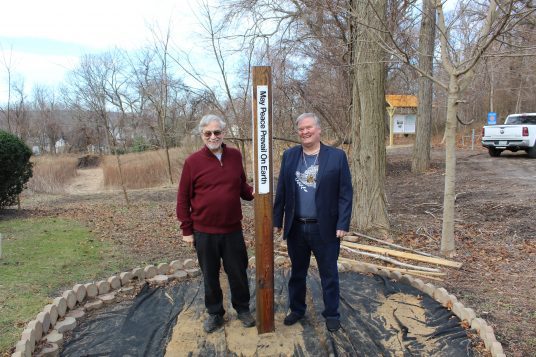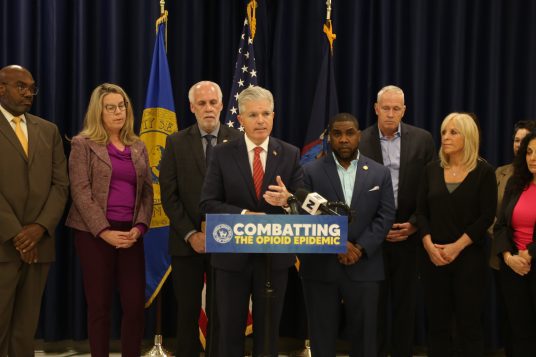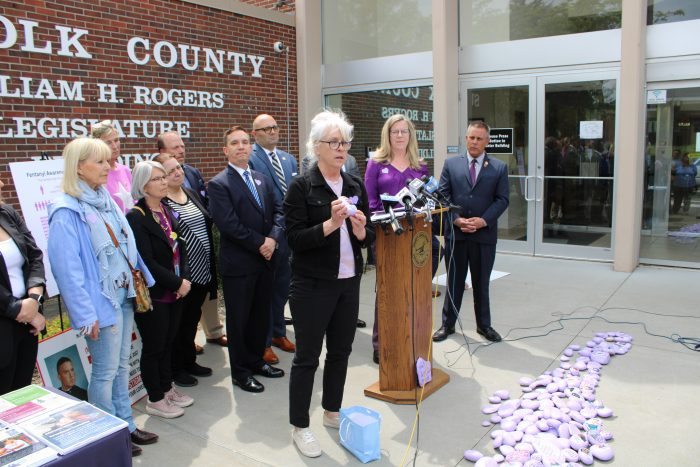By Daniel Dunaief
JoAnne Hewett hit the ground running when she arrived at Brookhaven National Laboratory.
She had no choice.
On her first day, Hewett, who is the first woman to lead the Department of Energy lab in its 76-year history, had to decide how to handle a technical problem at the Relativistic Heavy Ion Collider, a machine that collides heavy beams of ions traveling around a 2.4-mile track.
Hewett, who is a theoretical physicist and had worked as associate lab director for fundamental physics and chief research at SLAC at Stanford University, was “able to grasp everything very quickly,” said Haiyan Gao, associate lab director for Nuclear and Particle Physics at BNL.
BNL decided to end its run of experiments on Aug. 4, earlier than the original plan for the end of September. It took some time to determine the root cause of the problem, which, fortunately, turned out to be a singular event and not a failure of the system.
Gao found it “quite refreshing in the sense that [Hewett] was very interested in the experimental, technical part” of the decision and called it “the right call.”
After arriving at BNL in August, Hewett has impressed many of the staff at BNL and is developing plans for the lab that extend into the next decade and beyond.
TBR News Media is pleased to name Hewett, who is a leader, an inspirational role model and a “people person,” as a 2023 Person of the Year.
In an interview, Hewett described an active first few days on the job.
“There’s nothing like a good initiation,” Hewett said. “Because I do have a collider and accelerator background, it was an easy decision to make.”
RHIC is planning to restart in March, which is about a month behind the normal schedule. Hewett expects the ion collider to get a full run for fiscal year 2024.
‘A breath of fresh air’
Having a new leader at the lab who does things differently “gets noticed,” said John Hill, the deputy director for science and technology. “She’s a breath of fresh air.”
Indeed, one of Hewett’s priorities has been to meet with all the technicians at the lab. She schedules group interactions where she talks with about 10 people at a time.
In addition to listening to the perspective of other BNL staff, Hewett wants “people to be enthusiastic here,” said Luisella Lari, project manager for the Electron-Ion Collider and senior scientist at BNL. “She takes time to explain the vision.”
Hewett’s approach, which includes a focus on the work and on the people who make the science possible, “makes me feel sure she is on our side” as an advocate, Lari added.
The new BNL lab director appreciates the pride people take in their work and in the effort to make contributions to everything from basic science to applied research that has the potential to contribute to new technology and to provide solutions for various challenges.
“People love their contribution to the big science mission,” said Hewett. “No matter what their role is, they understand that their contribution is important. We can’t get science out the door without them.”
Hewett wasn’t surprised to hear suggestions for ways to improve the lives of people at BNL. At the top of many people’s lists was reopening the cafeteria, which has been closed since the COVID-19 pandemic.
“We’re working very hard to get that open,” said Hewett.
Scientific goals
Top administrators at BNL appreciate Hewett’s long-range focus on improving the science and enhancing the equipment that makes discoveries possible.
Home to the National Synchrotron Lightsource II, which cost about $1 billion to make and was completed in 2015, BNL is focused on opportunities to upgrade a facility that can look at the inner workings of batteries while they are working or explore the interplay between the structure and function of important enzymes.
One of Hewett’s first questions to Hill was “what do you think about an upgrade,” he recalled. Hill said when it was first built, the NSLS-II was the brightest in the world, and now one or two other synchrotrons are brighter. She wanted to upgrade it to “keep its competitive edge.”
Hewett explained that the NSLS-II has the capacity for 60 beamlines. BNL has built 32 and is either constructing or planning another 12 to 15, which leaves room to plan and build 15 additional beamlines.
“Finishing that out is important,” said Hewett.
At the same time, BNL will be holding science workshops to determine which of the accelerator physics options makes sense. Hewett is also focused on enhancing the lab’s computing power.
“All science is data science,” she said. “We work so hard to create the data, we have to make sure we record and process it. If you don’t do that, you might as well not have run the facility.”
BNL just signed a funding request for a series of planned upgrades.
Hill is developing a year-long computational strategy, which includes a focus on the needs for the facility for the next 10 years.
One of the biggest appeals of coming to BNL for Hewett and for other scientists around the country and the world is the Electron-Ion Collider.
BNL won a competition to build the EIC on Long Island, with the help of Thomas Jefferson National Accelerator in Virginia. By colliding electrons and protons, the EIC will reveal how the subunits of protons and neutrons in the nucleus — the quarks and gluons — come together to help generate mass in visible matter.
Hewett is “heavily involved in the EIC, making sure we can deliver on that,” said Hill.
Recently, the Department of Energy passed a critical design landmark, which provides a green light to make long lead procurement items. Specifically, BNL received the authority to spend $100 million on items for construction of the collider that will take years to procure.
This, Hewett explained, is the approval before a funding baseline and schedule for the project.
“These take so long to order,” she said. “It’s not like going into a Target and picking something off the shelf. It takes a long time to keep the schedule on track.”
Hewett said she had no doubt the EIC team would pass this milestone.
She described the procurement project group as a rock star team and she had no doubt that they were going to get it.
BNL won’t get the official approval to spend money until January.
An appreciated first
Choosing Hewett to serve in the top role at BNL has inspired some of her fellow scientists and could serve as encouragement to other underrepresented people in scientific fields.
Her experience makes her “the best person for the job,” said Lari. “This is what I’d put before thinking she’s a woman.”
Lari said she is “extremely proud to be a part of her team because [Hewett] is a really competent scientist, person, and the fact that she’s a woman is a plus.”
Having a female lab director helps with recruitment, added Hill.
In dealing with some human resource issues, Hewett asked questions that reflected some of the challenges she faced, Hill said. “That was eye opening to me and will stick with me,” he added.
Personal inspiration
On the personal side, Hewett, who is a Star Trek fan and makes a quick lunch meal of yogurt and berries in her office on the fly, shared some of her personal struggles and decisions.
In a BNL video, she explained that she is a breast cancer survivor who dealt with the dreaded disease 16 years earlier.
“My main message is to increase awareness and the importance of screenings,” said Hewett. “If one more person gets screened because of the video, then that’s a success.”
Gao applauded Hewett’s message, even as she wasn’t sure she or others would be comfortable sharing personal health issues.
As for her move from California, Hewett, who is an only child, brought her 93-year old father Bob across the country with her.
Her father had moved with the family three times when Hewett was two, seven and 14, which created some symmetry for the latest travels.
The senior Hewett was prepared to travel to Long Island to be with his daughter, whom he calls his “best buddy.”
A dedicated daughter and lab director, Hewett comes to work energized by the achievements and warmth of the staff.
“I knew, of course, about the science before I came,” she said. “What I didn’t know was how wonderful all the people are. Everyone is extremely dedicated to the mission in their role and what they do. It’s like family.”











 Lisa Parker, Coram
Lisa Parker, Coram
 Nancy and Brian Wegenaar,
Nancy and Brian Wegenaar, Chris Haydon, West Islip
Chris Haydon, West Islip Anthony Tallini, Coram
Anthony Tallini, Coram








